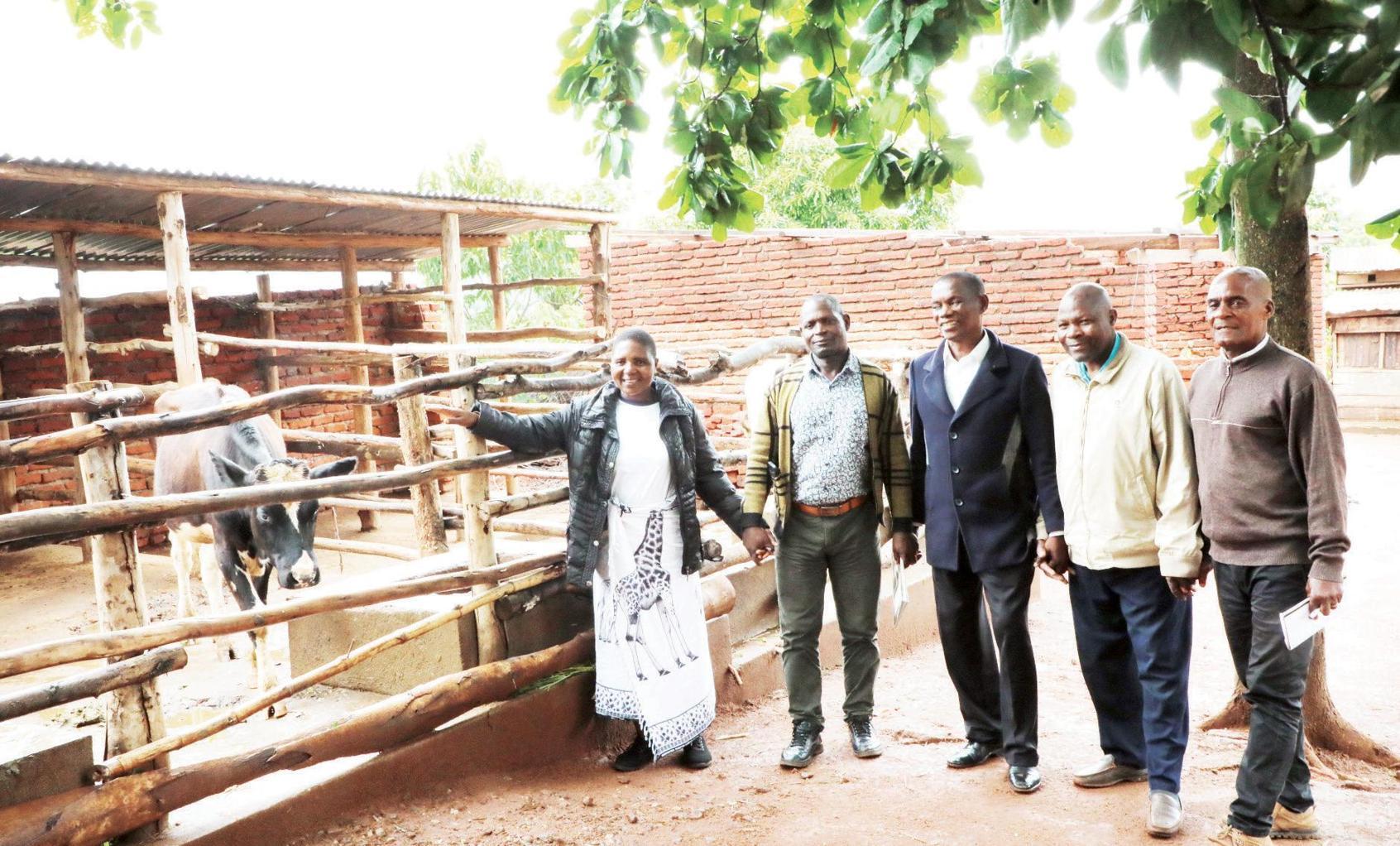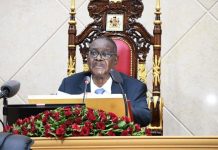By Alick Ponje
Africa-Press – Malawi. It all began with the frequent journeys of dairy farmers from the neighbouring Chiradzulu District, who sought pasture for their cattle in Mulanje.
These farmers, well aware of the challenges of dairy cattle farming, had long made the treks to collect bundles of grass for their herds due to the lack of sufficient pasture in their own areas.
What started as a necessity soon sparked an idea.
HAPPY FARMER—George Nkhoma in his flourishing maize fieldWhat if an area in Mulanje, where they were seeking pasture, could become a hub for dairy farming, not just a place where perennial rivers and lush pastures provided relief to farmers from other districts?
“We asked ourselves this question and realised it was possible to use the local resources as a starting point. The pasture here is abundant,” George Nkhoma, who later became chairperson of a dairy cooperative born from this inspiration, says.
Nkhoma recalls the moment the idea began to take shape.
“We decided we had the land, the resources and the determination. All we needed was to come together and take the first step,” he explains.
He fondly remembers the initial meetings—full of both uncertainty and excitement.
Today, Golden Dairy Cooperative stands as a testament to the determination of those farmers, a group that once only dreamt of dairy farming.
With Nkhoma, a retired soldier, at the helm, the cooperative has grown steadily, providing its members with better resources and knowledge.
For too long, the farmers in Traditional Authority Kadewere in Mulanje, like many others in the tea-growing district, had focused on subsistence crops, content with small-scale farming.
But the success of dairy farmers in Chiradzulu made them realise they had untapped potential in their own backyard.
“We were comfortable growing maize, beans and groundnuts. But when we saw the growth of dairy farming elsewhere, we realised we were missing something bigger,” Nkhoma adds, as he tends to two exotic cows in a clean kraal at the edge of his home compound.
United by a shared vision, the farmers in Mulanje decided to pursue dairy farming together, forming a cooperative.
However, pas s ion alone was not enough. They needed resources—equipment and dairy cattle being the most critical.
With limited funds, the road ahead was challenging but the community’s unity became their greatest strength.
THUNGA—Alone, we couldn’t make it work“We knew that if we didn’t come together, it would never happen. Alone, we couldn’t make it work,” cooperative member Feranji Thunga explains.
Each member contributed what they could—in cash, resources and skills—to ensure the collective dream could become a reality.
Thunga recalls how they pooled together their meagre resources, knowing it was their only way forward.
“We didn’t have much to start with,” she reflects, her voice filled with both determination and pride. “But we knew we had to contribute something. Each of us gave what we could.”
The group turned to the Agriculture Commercialisation (Agcom) project, a government initiative aimed at strengthening agricultural ventures across Malawi.
Phase 1 of the project, which concluded in 2023 before Phase 2 was introduced, focused largely on farmer groups producing for off-takers.
Phase 2 has expanded to include value addition and small-to medium-sized enterprises producing on a larger scale, while still buying from farmers to bridge gaps, aggregate and export.
In the Agcom model, farmers contribute a matching grant of 30 percent, in cash or kind, with the project covering the remaining 70 percent.
“So far, we have fulfilled half of our required contribution and received K41.8 million from Agcom, which we have used to purchase 50 head of cattle for 50 of our 100 members,” Nkhoma explains.
They are in the process of securing the remaining funds, now confident that the arrangement is working.
Despite the present excitement among members of Golden Dairy Cooperative, there were initial moments of hesitation and doubt.
The idea of pooling their hard-earned resources together for the possibility of larger support from Agcom seemed almost too good to be true.
For some members, the thought of entrusting their money and resources to a collective effort was daunting, especially when they were uncertain whether the project would deliver on its promises.
“We had heard of many projects before but not all of them came to fruition. The idea of giving away our money and resources—without knowing for sure that we would get the support we needed—felt risky,” member Michael Kumpoto admits.
Members of Golden Dairy Cooperative are now reaping the rewards of their new venture, even though the cows have yet to start producing milk.
The manure is already paying dividends.
“We are using it to improve our crops and the results are clear. Our maize fields are healthier and the bananas are thriving like never before,” Thunga says gleefully.
Member Christopher Nkhoma also praises the benefits of the cows.
“Before the cows arrived, we had to buy expensive fertilisers. But now, we use the manure from the cows and it works just as well, if not better. It is saving us money,” he says.
The cooperative’s members are also noticing improvements in livestock management.
Through the Agcom arrangement, they have access to extension services from experts at the district agriculture office, who regularly provide tips on tending their livestock.
“We are learning more about how to care for the cows. We are getting better at feeding them, managing their health and ensuring they are well looked after,” Nkhoma adds.
As Thunga stands in her maize fields, watching the vibrant green plants sway gently in the breeze, she feels a deep sense of hope for the future.
The transformation in her life—and in the lives of the other members of Golden Dairy Cooperative—feels like a dream come true.
“With the cows, the crops and the training we have received, I know my children will have a better life.
“I will be able to educate them without worrying about how to pay school fees. I will give them opportunities I never had,” she says, her voice full of conviction.
Previously, she struggled to provide for the children but now she can see a clear path forward.
“I will expand my crop production, grow more maize, bananas and other vegetables and use the income to send my children to school,” Thunga says.
Like the other members of Golden Dairy Cooperative, she envisions a future where the fruits of her hard work will bring stability and comfort.
“One day, I will build a modern house for my family. A house we can be proud of, with enough space for my children to study and grow.
“And most importantly, we will never go hungry again. The farm will provide everything we need. I can see it so clearly in my mind and it feels so real now,” she says.
The introduction of 50 dairy cows in this part of Mulanje has already sparked a sense of possibility and excitement within the community.
Kumpoto is confident that this success will inspire neighbouring farmers to venture into dairy farming themselves.
“When people see the benefits that we are reaping, they will want to join us. The cows have already made such a difference in our lives,” he says with conviction.
NAKHUMWA—We have learned valuable lessonsFor Agcom National Coordinator Teddie Nakhumwa, the success of farmer groups receiving support from Agcom holds great promise for the future of agriculture in Malawi.
Nakhumwa believes that when farmers embrace farming on such an advanced scale, the possibility of revolutionising the country’s agricultural sector becomes not only attainable but increasingly realistic.
He says that in Phase 2, Agcom has broadened its scope by including aggregators, processors, anchor farmers and exporters.
“We believe this makes the commercial concept even more complete. We have learned valuable lessons from Agcom Phase 1, which focused largely on farmers and buyers,” Nakhumwa explains.
He acknowledges that there was initial reluctance and scepticism about the programme’s viability, with many farmers unsure about the level of support.
However, Nakhumwa notes that over time, Agcom’s approach has proven its worth.
More awareness campaigns and real success stories have resulted in an overwhelming response in Agcom Phase 2, he says.
“They now realise that with the right resources, training and support, they can contribute to revolutionising agriculture in Malawi,” Nakhumwa says.
He believes that the success of Agcom Phase 1, which was funded by the World Bank to the tune of $95 million, has attracted more partners, including the Irish Government, the European Union and the Flemish Government, who have joined the World Bank in the $326 million Agcom Phase 2.
For members of Golden Dairy Cooperative, the possibility of thriving through farming has never seemed more real.
They no longer see themselves simply as farmers.
“We are part of something bigger. Dairy farming has brought new opportunities and new hope to our community,” George Nkhoma says, his face glowing with optimism.
Source: The Times Group
For More News And Analysis About Malawi Follow Africa-Press






